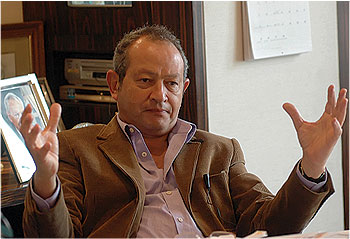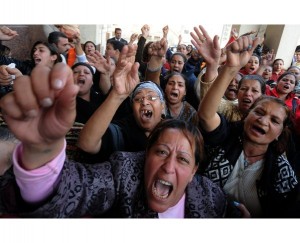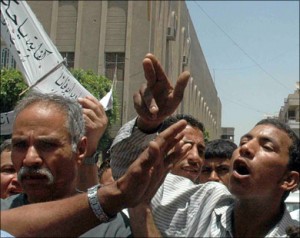
A Christian businessman who is one of Egypt’s richest entrepreneurs, has run afoul of the internet’s social media after sending out a message of Mickey and Minnie Mouse dressed as conservative Muslims.
The cartoon, which was already circulating by email and on various websites, shows the Disney cartoon figures in full Muslim attire. Mickey is wearing a traditional Islamic robe with a full beard. Minnie Mouse is in a niqab – a full-body veil – with just her eyes showing, but identifiable by her trademark ears and familiar pink hair ribbon
“Telecoms mogul and Coptic Christian Naguib Sawiris apologized for re-posting the images on Twitter a few days ago, saying he meant no offense,” reported BBC News. “But several Islamic lawyers have filed a formal complaint and there are calls for a boycott of his businesses.”

“Fourteen Islamist lawyers, spearheaded by Mamdouh Ismail, who is leading the efforts to form a Salafist fundamentalist party, filed a complaint to the Chief Prosecutor,” reported the Egyptian Gazette. “Sawiris, one of Egypt’s wealthiest businessmen, who turned to politics after the January 25 revolution, posted a cartoon of Mickey Mouse with an Islamic beard, dressed in a short gallabiya, and another of Minnie Mouse, with her face veiled, on the social networking website Twitter. The comment: ‘Mickey and Minnie after’ accompanied the cartoon.
“The images were very offensive and ridiculed the Islamic faith. That’s why we have approached the Public Prosecutor against Sawiris,” Ismail said. He added that the reason why they were suing Sawiris was not because he is a Coptic Christian.
“Insulting religion is criminalized by all divine faiths and Sawiris would not like it if a Muslim mocked the clothes of Christian clerics,” said the lawyer.
The outcry comes at a time of high tension between Egypt’s Christians and Muslims. Christians make up about 11 percent of the population.
“There are also concerns about the growing influence of the ultra-conservative Salafists in Egypt,” reported BBC. “Salafists take their inspiration from the early generations of Muslims who were close to the Prophet Muhammad and his message.”

“The Christian Copt telecommunications mogul,” reported the Los Angeles Times, “who has emerged as a provocative voice in post-revolutionary Egypt, apologized on Twitter, saying that he meant the picture to be humorous, not an affront to the country’s majority population of Muslims. ‘I apologize for those who don’t take this as a joke. I just thought it was a funny picture no disrespect meant! I’m sorry,’ the magnate tweeted.
“Nonetheless,” reported the Times, “Sawiris’ apology wasn’t enough to halt the fury and criticism from many Muslims, especially the ultraconservative Salafis, whose lawyers have already sued the billionaire. A Facebook group launched under the name ‘we are also joking, Sawiris’ gathered no less than 90,000 members in recent days, calling for boycotting products or services sold by any of the businessman’s companies, especially the Mobinil mobile phone company.
“If you’re a real Muslim … boycott his (Sawiris’) products if you love your religion. We have to cut the tongue of any person who attacks our religion,” reads one message. Several other Facebook groups under the same name as well as “we hate you Mickey Sawiris” also collected thousands of members angry at what they called “Sawiris’ mockery of and disrespect to Islam.”
A number of Islamic clerics have appeared on Egyptian and Arab media channels to denounce Sawiris’ act.
“We can’t stay silent at any defaming campaigns towards religious symbols. Would Sawiris accept that a nun or a priest gets ridiculed?” Islamic preacher Safwat Hegazi asked in the Al Quds al Arabi newspaper.

“Shares of both Mobinil and Sawiris’ Orascom Telecom fell on the Egyptian stock exchange Monday,” reported the Times. “This is the second time Sawiris has indirectly provoked Salafis. The first clash came in 2007, when the businessman said that he was “not against veil, but when he walks in the streets of Egypt, he feels like a stranger” due to the growing number of veiled women.
The latest flap follows recent attacks by radical Muslims against Christian institutions in Cairo, including the May burning of the Virgin Mary Church and ensuing clashes that left 12 people dead and 230 wounded in the poor neighborhood of Imbaba.
Mobs burned down several Christian-owned homes, surrounded a church and threatened to kill a priest last week in unrelated incidents elsewhere in Egypt.
On Saturday in Awlad Khalaf village, just outside Sohag, 240 miles south of Cairo, local Muslims attacked Coptic Christian Wahib Halim Atteyah, robbed him of US$8,530, and bulldozed his home along with the other structures on his property, according to local media. The group then raided six other Coptic-owned homes and burned them to the ground. Most of the stolen items were returned because of efforts of other Muslims in the area, according to Egyptian newspaper Watani.
Villagers had begun circulating a rumor that Atteyah was constructing a church building on his property. Atteyah was reportedly building a house but also built a barn and a livestock facility in violation of a permit that allowed him to build on 95 square meters of land.
Atteyah and another Coptic Christian, Ihab Na’eem, were later arrested and charged with using firearms to attempt to defend the property, a charge Atteyah said was untrue. Two Muslims accused of setting Christians’ houses on fire also have been arrested.

In Beni-Ahmed al-Gharbiya village near the town of Minya, 136 miles south of Cairo, a group of Salafi Muslims surrounded the Church of St. George and demanded that the parish priest, the Rev. Gorgy Thabet, leave the village or they would kill him and hold Muslim prayers in the church building. Security police kept the mob from breaking into the church building, then removed the priest from the village. It was not known if there were any injuries in the incident.
In March, groups of Muslims protested at the church site after learning the congregation had begun expanding a building on church property. After the Muslims forced the Christians into a “reconciliation meeting” by threatening to attack the church building, the expansion project was abandoned.
The group also demanded that Thabet leave. Church officials refused, but then removed the priest temporarily in an apparent attempt to appease Islamic extremists in the community.
The two attacks broke a relative calm that had existed in Egypt since late May, when a group of Muslims surrounded a church in Ain Shams, Cairo. The week before that, a group of Muslims attacked two church buildings in Cairo, setting one on fire.
At least 12 people were killed and more than 200 were wounded when a mob attacked two churches and surrounding Christian-owned homes and businesses in a poor section of Cairo on May 7.

